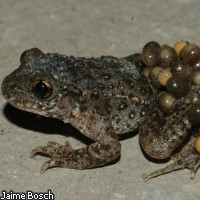Research may help check deadly infection threatening toads
EU-funded scientists have discovered that midwife toads living high in the mountains are more likely to die from a serious fungal infection than their counterparts living at lower altitudes. The findings, which are published in the journal Ecology Letters, could help conservationists develop strategies to stop the spread of the disease. A team of UK scientists from Imperial College London and the Zoological Society of London were joined by members of the RACE ('Risk assessment of chytridiomycosis to European amphibian biodiversity') project, which received funding support from the BIODIVERSA ERA-NET (European Research Area Network). According to the RACE team, 18 of Europe's 81 species of amphibians are currently threatened with extinction. The infectious pathogen, Batrachochytrium dendrobatidis (Bd), is partly responsible, with statistics suggesting the fungus infects one third of European amphibians. Often invisible to the naked eye, Bd infects the skin of amphibians and causes a disease known as chytridiomycosis, which causes 10% of amphibian deaths in Europe. Human activity is a culprit in the spread of the disease, with tourists unknowingly assisting the fungus to spread across regions and the rest of the world. 'Chytridiomycosis is a serious problem for amphibians all over the world, and the disease is causing extinctions at a shocking rate,' explained Dr Matthew Fisher of Imperial College London. 'At the moment, we have no prevention or cure for Bd infection in the wild so we need to act fast to stop it from spreading to otherwise healthy populations.' Although research into the fungus and its effects is well documented in other parts of the world, little was known about the prevalence of Bd in Europe prior to this five-year study. The research was conducted on the species of midwife toad known as Alytes obstetricans that lives along the Iberian Peninsula in parts of Spain and Portugal. Midwife toads are common in Europe and perform an important role in ecosystem function. The team found that up to 100% of infected midwife toads living in high altitudes died as a result of the fungus; in comparison, no toads living at low altitudes died because of Bd. The scientists suggest that the increase in mortality in high altitudes could be due to the colder climate, where toads are possibly less able to fight the fungus, or because the fungus is better adapted to cooler temperatures. The team hopes to investigate this point further in the future. High altitudes, such as mountain ranges, are tourist hotspots, said Dr Fisher, and if tourists are visiting lakes, they may be carriers of the deadly disease. 'In order to limit the devastation this fungus could potentially cause, we need to invest money and expertise in stopping it from spreading. Simple measures, such as disinfecting tourists' boots when they cross infected areas, and providing them with uninfected sources of water so they don't spread fungal spores between lakes may be effective ways of tackling this problem.' Dr Fisher added that there is an additional threat by way of the introduction of artificially reared fish into high-altitude lakes. He explained that this activity could likewise spread the disease to new areas, and that research is also needed to determine if this is already taking place. BIODIVERSA was funded by the EU under the Sixth Framework Programme (FP6). The network, which comprises 19 major funding agencies from 15 European countries, is committed to the pursuit of transnational cooperation in the field of biodiversity research funding.
Countries
Spain, France, United Kingdom



